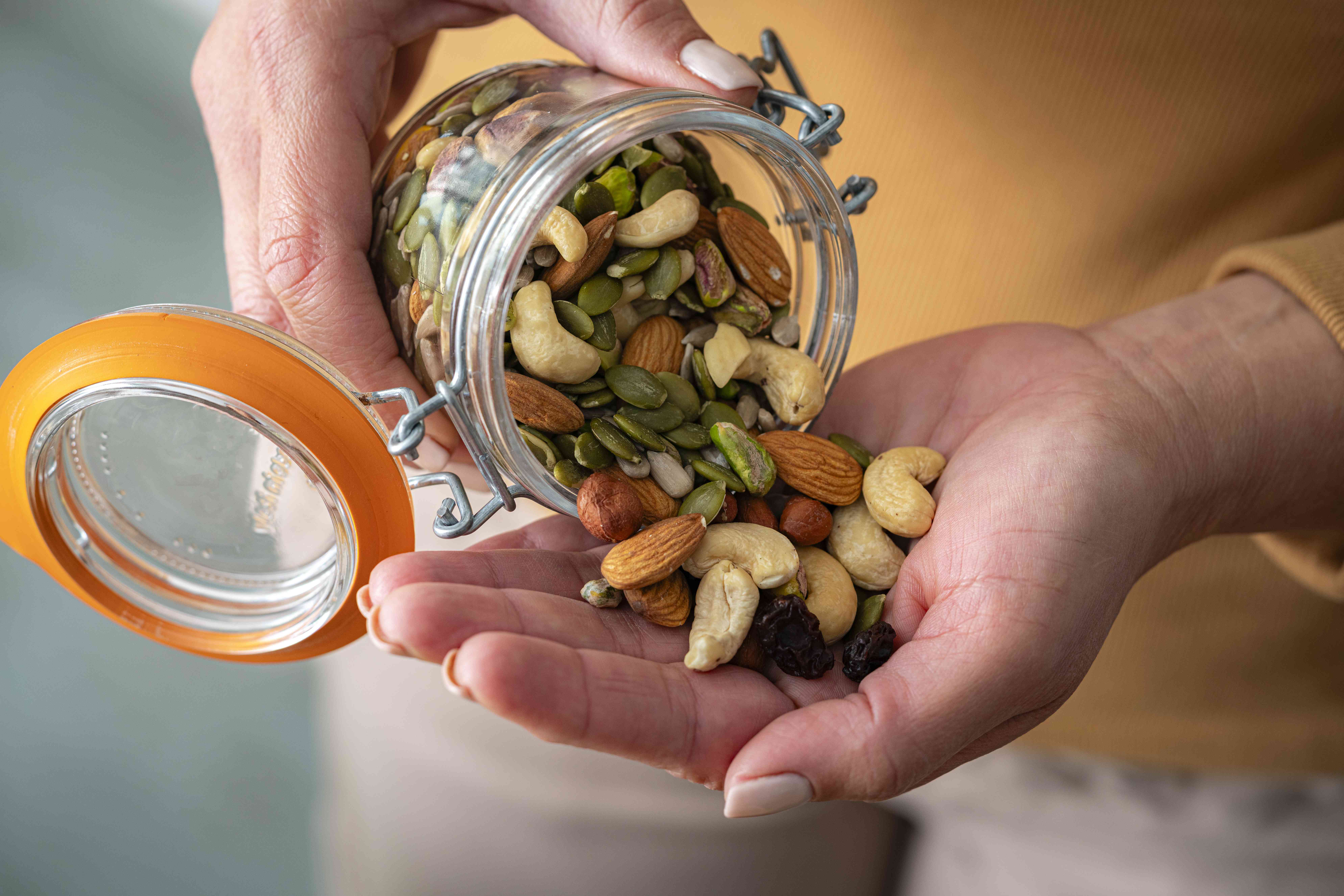
Diet plays a role in diverticulitis risk—but not in the way you might think.
A new study published in the Annals of Internal Medicine revealed that eating nuts, seeds, and corn was not associated with an increased chance of a diverticulitis diagnosis in women. What did matter in terms of diverticulitis risk? Broader diet patterns, smoking, heavy alcohol use, and excess weight.
Diverticulitis occurs when pouches called diverticula form in the colon and become inflamed. It can cause symptoms like abdominal pain, fever, and changes in bowel habits.
The study findings debunk a common misconception that small, hard foods could cause diverticulitis—or damage the compromised intestinal wall in people with the condition. They also expand upon previous study results that only applied to men.
“A single study published in JAMA in 2008 found no association between these foods and the development of diverticulitis in men,” study author Anne Peery, MD, an associate professor of medicine at the University of North Carolina, Chapel Hill, told Health. “This study has never been replicated. Although many providers no longer make this recommendation, many patients with a history of diverticulitis continue to limit these foods in their diet.”
For years, avoiding small, hard foods was considered gold standard dietary guidance for people with diverticulitis.
“Foods like nuts, seeds, and corn were historically considered problematic due to the belief that these small, hard particles could become lodged in diverticula, leading to inflammation or infection,” Sandhya Shukla, MD, a gastroenterologist at Atlantic Coast Gastroenterology Associates in New Jersey, told Health.
However, more recent evidence has challenged this notion, such as the 2008 study that found it to be false for men. Because research has been lacking in women, Peery and her colleagues aimed to pin down whether this applied to females, too.
The researchers studied data on over 29,000 women aged 35 to 74. The participants completed questionnaires that detailed their dietary habits from 2003 to 2009 and then every two to three years until 2022.
Using statistical analysis tools, the researchers determined that women who ate foods like nuts, seeds, and fruits with seeds—even in large amounts—had no higher risk of developing diverticulitis than those who ate these foods less often. The research also found no association between eating these foods and needing surgery or hospitalization for diverticulitis.
The study did have a few limitations, though. The researchers included women who said they had diverticulitis or diverticulosis (in which colon pouches are present but are not inflamed). Because diverticulosis doesn’t cause symptoms, some cases may have been missed, making results harder to interpret. Plus, the researchers acknowledged that their study was correlational, not causational and that unknown factors could have affected outcomes.
Though nuts, seeds, and corn are no longer on the naughty list for diverticulitis, other, more general diet and lifestyle factors do seem to make a meaningful difference to risk.
The new study found that women with diverticulitis were more likely to be current or former smokers, report heavy alcohol use, and have a BMI classified as overweight or obese, compared with those without diverticulitis. Additionally, being postmenopausal and using menopausal hormone therapy increased risk.
Shukla added that overall diet choices, rather than specific “no-no” foods, are a likely indicator of developing diverticulitis.
“Dietary patterns, such as the Western diet, which involves the consumption of red meats, processed foods, and high-fat dairy, are associated with a higher risk,” she said. A 2021 review of 8 studies confirmed that people who ate Western diets high in red meat were more likely to experience diverticulitis.
The researchers also examined how four healthy eating plans—the Mediterranean diet, Dietary Approaches to Stop Hypertension (DASH) diet, Healthy Eating Index 2015, and Alternative Healthy Eating Index 2010—might affect diverticulitis risk. They found that all of them reduced it.
This isn’t surprising, according to Kim Kulp, RDN, owner of Gut Health Connection in the San Francisco Bay Area.
“Diet patterns like the Mediterranean diet, which include a variety of plant foods, have been shown to decrease the risk of diverticulitis,” she told Health. “Eating lots of fruits, vegetables, whole grains, nuts, seeds, and legumes provides fuel for the good gut microbes, which protect the intestinal lining from inflammation that can lead to diverticulitis.”
In fact, some research has found that the health of the gut microbiome is a strong predictor of whether people develop diverticular disease. Because fiber is such a critical component in maintaining a healthy microbiome, Kulp said more of this nutrient is better for minimizing diverticulitis risk.
It’s important to follow your doctor’s guidance for your specific digestive issues. But ultimately, previous clinical guidance to nix certain foods is not only outdated—it’s diametrically opposed to today’s understanding of diet for diverticulitis.
“Since corn, nuts, and seeds contain fiber and haven’t been shown to cause more diverticulitis, these foods should be included, not avoided,” Kulp said.
